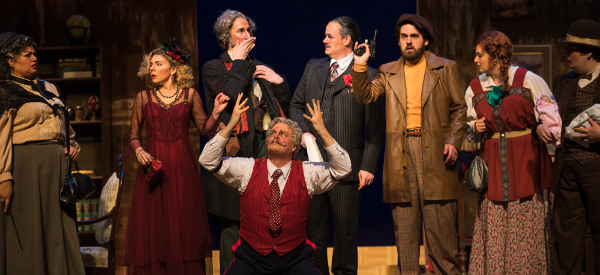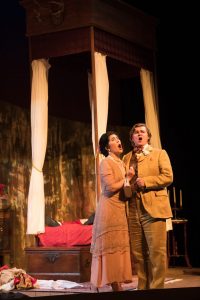
Puccini: Gianni Schicchi & Ching: Buoso’s Ghost. OperaDelaware, May 2018.
When Brendan Cooke became General Director of OperaDelaware he inaugurated annual festivals with specific themes. In 2016 it was Shakespeare (Verdi’s Falstaff and Faccio’s Hamlet) and in 2017 it was a contrast of Rossini comedy versus tragedy (Cenerentola and Semiramide).
This May his company is celebrating the centennial of Puccini’s Trittico. They’re doing it with creativity by pairing Gianni Schicchi with a contemporary sequel to Schicchi written by Michael Ching called Buoso’s Ghost and by setting both in the year of Puccini’s composition, 1918. In a separate double bill, the other two-thirds of Puccini’s trilogy are performed, Il Tabarro and Suor Angelica.
This programming deserves praise for its cleverness and appropriateness. OperaDelaware is on a laudable course. What’s more, its productions are musically accomplished.
Gianni Schicchi, you will recall, is a comedy about a greedy family duped out of an inheritance by a rogue. It was based on a 13th-century story in Dante’s The Divine Comedy. Here, the production’s shift of time adds a pertinent element. In 1918 many Italians were relocating, moving to Florence from the provinces and bringing a fresh breath of life to that old city.
Instead of people in the robes of Dante’s time, we see Cosa Nostra types, a logically updated concept of a ruling family with a sense of entitlement. Schicchi, the outsider, is dressed as a train conductor. He is a civil servant, a member of the working class. When the old man, Buoso Donati, dies and his family discovers that he left his fortune to friars, they are furious. Schicchi offers to impersonate Buoso and dictate a new will that distributes his estate among the relatives; but Schicchi tricks them and leaves everything “to my good friend, Gianni Schicchi.”
At the end, Schicchi steps to the footlights and speaks the line: “Ditemi voi, signori, se i quattrini di Buoso potevan finir meglio di così?” (“Excuse me, but could Buoso’s money end up better than that?”)
In 1996, the then-37-year-old American conductor Michael Ching wrote a sequel called Buoso’s Ghost which tells what happens in the hours following the end of Gianni Schicchi. Writing his own libretto, Ching utilizes the melodies of Puccini and embellishes them and weaves them together with inventiveness of his own in a frothy, bubbling continuation of the story.
A. Scott Parry, an old colleague of Cooke, directs both operas with sets by Stephen Dobay and costumes by Howard Tsvi Kaplan. The two opera make a great pairing, a continuation of laughter which seems natural. Ching conducts both ends of the double bill, his opera and Puccini’s, with effervescence.
Sean Anderson makes a commanding Schicchi. This is a real ensemble opera, so the rest of the casts need to be listed in full: Sara Duchovnay, Kirk Dougherty, Claudia Chapa, Matthew Curran, Orin Strunk, Dana MacIntosh, Gus Cooke, Andrew Pardini, Alexandra Rodrick, Hans Tashjian, Garrett Obrycki, Wesley Morgan, James Ofalt, Ciro Poppiti.
The staging of Duchovnay’s aria, “O mio babbino caro,” is especially clever. The aria is a brief, throw-away number in the midst of an ensemble; yet it has become one of the world’s most familiar melodies. Parry arranges for Duchovnay to come downstage, project her lovely voice and please the audience, while still keeping it integral within the plot.
Below, Duchovnay and Dougherty sing romantically:
